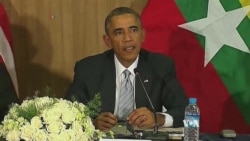ປະທານາທິບໍດີບາຣັກ ໂອບາມາ ໄດ້ຍົກເອົາບັນຫາທີ່ເປັນສ້ຽນ
ໜາມຂຶ້ນມາໂອ້ລົມ ໃນຂະນະທີ່ທ່ານພົບປະກັບ ພວກຜູ້ນຳລັດ
ຖະບານ ແລະຝ່າຍຄ້ານຂອງມຽນ ລະຫວ່າງການໄປຢ້ຽມຢາມ
ປະເທດດັ່ງກ່າວ ເປັນຄັ້ງທີສອງ. ທ່ານໂອບາມາ ເລີ້ມການຢ້ຽມ
ຢາມຂອງທ່ານ ໂດຍເຂົ້າຮ່ວມກອງປະຊຸມສຸດຍອດຂອງສະມາ ຄົມບັນດາປະຊາຊາດໃນເຂດເອເຊຍຕາເວັນອອກສຽງໃຕ້ຫຼືອາ
ຊ່ຽນຊຶ່ງມຽນມາເປັນເຈົ້າພາບໃນປີນີ້. Luis Ramirez ຜູ້ສື່ຂ່າວ
ຂອງວີໂອເອ ປະຈຳທຳນຽບຂາວທີ່ເດີນທາງໄປກັບປະທານາທິ
ບໍດີມີລາຍງານກ່ຽວກັບເລື່ອງນີ້ຈາກນະຄອນຫຼວງເນປີດໍ ດັ່ງໄພ
ສານຈະນຳເອົາລາຍລະອຽດ ມາສະເໜີທ່ານໃນອັນດັບຕໍ່ໄປ.
ການຮ້ອງເພງແລະຟ້ອນສະແດງພ້ອມທັງງານລ້ຽງອາຫານຄ່ຳ
ຕ້ອນຮັບບັນດາປະມຸກ ຂອງປະເທດຕ່າງໆ ຢູ່ຫໍປະຊຸມໃໝ່ ທີ່ສວຍງາມ ແມ່ນສະແດງໃຫ້ ເຫັນວ່າ ມຽນມາໄດ້ກ້າວມາໄກປານໃດແລ້ວ ນັບຕັ້ງແຕ່ໄດ້ໂຜ່ໂຕອອກມາຈາກການປົກ ຄອງແລະການໂດດດ່ຽວຂອງນາໆຊາດ ເປັນເວລາຫຼາຍໆທົດສະວັດ.
ປະທານາທິບໍດີໂອບາມາ ໄດ້ກ່າວຊົມເຊີຍມຽນມາ ແລະຜູ້ນຳຂອງປະເທດ ຄືປະທານາທິ
ບໍດີ ເທນ ເຊນ ທີ່ໄດ້ເປັນເຈົ້າພາບຈັດກອງປະຊຸມສຸດຍອດໃນຄັ້ງນີ້.
ທ່ານໂອບາມາ ເວົ້າວ່າ “ປະທານາທິບໍດີ ເທນ ເຊນ ຂ້າພະເຈົ້າຂໍຂອບອົກຂອບ ໃຈ ຕໍ່ການຕ້ອນຮັບ ອັນອົບອຸ່ນຂອງທ່ານ ແລະຈັດກອງປະຊຸມສຸດຍອດ ທີ່ດີເລີດໃນ ຄັ້ງນີ້. ຂ້າພະເຈົ້າຄິດວ່າ ມຽນມາໄດ້ແບກຫາບພາລະຢ່າງໃຫຍ່ຫຼວງໃນການເປັນ ປະທານຂອງອາຊ່ຽນ ໃນປີນີ້ ແລະໄດ້ສະແດງໃຫ້ເຫັນ ເຖິງການເປັນຜູ້ນຳທີ່ໜັກ ແໜ້ນກ່ຽວກັບບັນຫາທີ່ຫຼໍ່ແຫຼມສຳຄັນຕ່າງໆຕໍ່ໝົດທັງຂົງເຂດ.”
ແຕ່ຫລັງຈາກເຂົ້າຮ່ວມກອງປະຊຸມ ການຮ່ວມມືພູມີພາກແລ້ວ ທ່ານໂບບາມາກໍໄດ້ໂອ້ລົມ ແບບເປັນລ້ຳເປັນສັນຫຼາຍຂຶ້ນກ່ຽວກັບແຜນການຂອງທ່ານ ນັ້ນກໍຄືການຊຸກຍູ້ໃຫ້ມີການ ປະຕິຮູບທາງດ້ານການເມືອງ ຢູ່ໃນມຽນມາ ທີ່ທ່ານກ່າວວ່າ ບໍ່ໄວພໍດັ່ງທີ່ຫລາຍໆຄົນຄາດ ຫວັງໄວ້ເມື່ອສີ່ປີກ່ອນ ເວລາປະເທດດັ່ງກ່າວ ເລີ້ມການປ່ຽນແປງ ຈາກການປົກຄອງເປັນ ເວລາຫລາຍທົດສະວັດຂອງພວກທະຫານ.
ໃນການໃຫ້ສຳພາດແກ່ວາລະສານສະບັບນຶ່ງຂອງມຽນມານັ້ນປະທານາທິບໍດີເວົ້າວ່າ ໃນ ໄລຍະສອງປີ ນັບຕັ້ງແຕ່ທ່ານໄດ້ໄປຢ້ຽມມຽນມາເທື່ອທຳອິດ ເມື່ອປີ 2012 ນັ້ນ ທ່ານໄດ້ ເຫັນຄວາມກ້າວໜ້າ ທີ່ຮວມທັງ ການປະຕິຮູບເສດຖະກິດ ການປ່ອຍພວກນັກໂທດການ ເມືອງແລະການເລີ້ມຕົ້ນຂະບວນການປະຕິຮູບລັດຖະທຳມະນູນ.
ແຕ່ທ່ານໂອບາມາກໍເວົ້າວ່າ ໃນຂະນະດຽວກັນ ກໍມີການຖອຍຫຼັງ ຢູ່ໃນບາງດ້ານ. ອະດີດ ພວກນັກໂທດການເມືອງ ຍັງສືບຕໍ່ຖືກຈຳກັດຮັດແຄບ ໃນຂະນະທີ່ພວກນັກຂ່າວ ຍັງປະ ເຊີນກັບການຖືກສັງຫານ ຖືກຈັບກຸມຄຸມຂັງ ແລະຖືກຮາວີລົບກວນ.
ດ້ານນຶ່ງທີ່ມີຄວາມກັງວົນເປັນພິເສດສຳຫລັບຜູ້ນຳຂອງສະຫະລັດ ກໍຄືສະພາບຂອງພວກ ມຸສລິມໂຣຮິງຢາຊຶ່ງເປັນຊົນກຸ່ມນ້ອຍທີ່ມີຫຼາຍກວ່ານຶ່ງລ້ານຄົນສ່ວນໃຫຍ່ແລ້ວແມ່ນບໍ່ທັນ ໄດ້ຮັບສັນຊາດມຽນມາເທື່ອ. ຫຼາຍໆພັນຄົນໄດ້ຖືກບັງຄັບໃຫ້ໄປຢູ່ຕາມສູນຕ່າງໆຫຼັງຈາກ ໄດ້ເກີດການປະທະກັນກັບຊາວພຸດ ທີ່ລັດ Rakhine ເມື່ອປີ 2012.
ບັນຫາເລື່ອງສັນຊາດຂອງຊາວໂຣຮິງຢາແມ່ນເປັນເລື່ອງທີ່ມີຄວາມສຳຄັນແລະອ່ອນໄຫວ ທາງດ້ານການເມືອງໃນມຽນມາ. ເຖິງປານນັ້ນກໍດີ ປະທານາທິບໍດີສະຫະລັດກໍມີແຜນການ
ທີ່ຈະຍົກເອົາເລື່ອງນີ້ຂຶ້ນມາໂອ້ລົມກັນໃນລະຫວ່າງການພົບປະກັບພວກຜູ້ນຳລັດຖະບານ ແລະຝ່າຍຄ້ານ ຮວມທັງທ່ານນາງອອງຊານ ຊູຈີ ຜູ້ທີ່ມີຊື່ສຽງ ທີ່ທ່ານໂອບາມາມີແຜນການ ທີ່ຈະພົບປະຢູ່ນະຄອນຢ່າງກຸ້ງໃນວັນສຸກມື້ນີ້ ແລະທ່ານນາງໄດ້ຖືກຕິຕຽນ ຍ້ອນບໍ່ເອົາທ່າ ທີກ່ຽວກັບບັນຫາດັ່ງກ່າວ.
ທ່ານ Ben Rhodes ຮອງທີ່ປຶກສາທາງດ້ານຄວາມໝັ້ນຄົງແຫ່ງຊາດຂອງປະທານາທິບໍດີ ກ່າວຕໍ່ພວກນັກຂ່າວທີ່ມຽນມາວ່າ ການປ່ຽນແປງ ໄປສູ່ການປົກຄອງແບບປະຊາທິປະໄຕ ທີ່ມີສະຖຽນລະພາບ ແມ່ນເປັນໄປບໍ່ໄດ້ ໂດຍປາດສະຈາກ ການແກ້ໄຂບັນຫາຊາວໂຣຮິງ
ຢາ.
ທ່ານ Rhodes ເວົ້າວ່າ “ພວກເຮົາ ຮັບຮູ້ວ່າ ນີ້ແມ່ນບັນຫາ ທີ່ສະລັບຊັບຊ້ອນ ຢູ່ໃນ ມຽນມາ ທີ່ພວກເຂົາເຈົ້າຕ່າງກໍມີຄວາມເຫັນຢ່າງເລິກເຊິ່ງທີ່ເປັນທັດສະນະຄວາມ ເຫັນທີ່ມີການຖົກຖຽງໂຕ້ແຍ້ງ ທາງປະຫວັດສາດ ແຕ່ກໍບໍ່ສາມາດ ປ່ຽນແປງຄວາມ ຈິງທີ່ວ່າ ມີສິດທິສາກົນ ຂັ້ນພື້ນຖານບາງຢ່າງ ທີ່ທຸກໆຄົນຈຳເປັນຕ້ອງມີນັ້ນ.”
ຫຼັງຈາກພົບປະກັບທ່ານນາງອອງຊານ ຊູຈີ ໃນວັນສຸກມື້ນີ້ແລ້ວ ປະທານາທິບໍດີໂອບາມາ ກໍຈະມຸ້ງໜ້າ ໄປນະຄອນ Brisbane ປະເທດອອສເຕຣເລຍ ເພື່ອເຂົ້າຮ່ວມ ກອງປະຊຸມ ສຸດຍອດຂອງກຸ່ມຈີ 20 ບ່ອນທີ່ມີທ່າທາງວ່າເລື່ອງຢູເຄຣນຈະຄອບງຳການສົນທະນາຫາ ລືກັນຢູ່ຂ້າງນອກຂອງກອງປະຊຸມ.
ພວກຜູ້ຊ່ອຍຂອງປະທານາທິບໍດີີໂອບາມາຄາດວ່າ ຈະຈັດການພົບປະເຈລະຈາກັບພວກ ຜູ້ນຳຢູໂຣບ ຫຼັງຈາກມີຫລັກຖານ ທີ່ສະແດງໃຫ້ເຫັນ ໃນອາທິດນີ້ວ່າ ຣັດເຊຍ ຍັງສືບຕໍ່ສົ່ງ ອາວຸດຍຸດໂທປະກອນແລະທະຫານ ຂ້າມຊາຍແດນເຂົ້າໄປໃນຢູເຄຣນ.
ຮວມຢູ່ໃນບັນດາຜູ້ນຳ ທີ່ໄປຮ່ວມກອງປະຊຸມສຸດຍອດ ຂອງກຸ່ມຈີ 20 ກໍມີປະທານາທິບໍດີ ຣັດເຊຍ ທ່ານ Vladimir Putin ນຳດ້ວຍ.
President Barack Obama is raising thorny issues as he meets with Myanmar's government and opposition leaders on his second visit to the country, also known as Burma. Mr. Obama started his visit attending a summit of the Association of Southeast Asian Nations (ASEAN), which Myanmar is hosting this year. VOA White House correspondent Luis Ramirez is traveling with the president and has this report from Myanmar's capital, Naypyitaw.
A song and dance show and a gala dinner for heads of state in a slick new convention center showed how far Myanmar has come since emerging from decades of military rule and international isolation.
President Obama praised Myanmar and its leader, Thein Sein, for hosting the gathering.
"President Thein Sein, I want to thank you for your hospitality and for bringing together this excellent summit. I think Myanmar has done a tremendous job chairing ASEAN this year and has shown solid leadership on issues of critical importance to the entire region."
But after attending meetings on regional cooperation, Mr. Obama got to the more substantial part of his agenda:promoting political reforms in Myanmar that he says have not come as fast as many had hoped four years ago when the country began its transition from decades of military rule.
In an interview with a Myanmar magazine, the president said that in the two years since his first visit in 2012, he has seen progress that includes economic reforms, the release of political prisoners, and the beginnings of a constitutional reform movement.
But Mr. Obama said there has also been some backsliding. Former political prisoners continue to deal with restrictions while journalists are still facing killings, arrest, and harassment.
One area of special concern for the U.S. leader is the condition of the Rohingya people, a Muslim minority of more than one million people, most of whom do not have citizenship. Thousands have been forced to live in camps following clashes with Buddhists in 2012 in Rakhine state.
The issue of citizenship for Rohingyas is politically sensitive in Myanmar. Still, the U.S. president planned to bring it up in meetings with both the government and the opposition, including the renowned Aung San Suu Kyi, who Mr. Obama plans to see in Yangon on Friday, and who has been criticized for not taking a stand on the issue.
The President's Deputy National Security Adviser, Ben Rhodes, told reporters here a transition to a stable democracy is not possible without addressing the Rohingya question.
"We recognize that this is a very complex issue here in Burma that they're deeply held views, that there are contested views of history, but doesn't change the fact that there are certain fundamental, universal rights that need to apply for all people."
After meeting with Aung San Suu Kyi on Friday, the President heads to Brisbane, Australia, for the G-20 summit, where the subject of Ukraine will likely dominate discussions on the sidelines.
Aides say President Obama expects to hold talks with European leaders following evidence this week that Russia continues to send equipment and troops across the border into Ukraine.
Among the leaders attending the G-20 summit will be Russian President Vladimir Putin.







